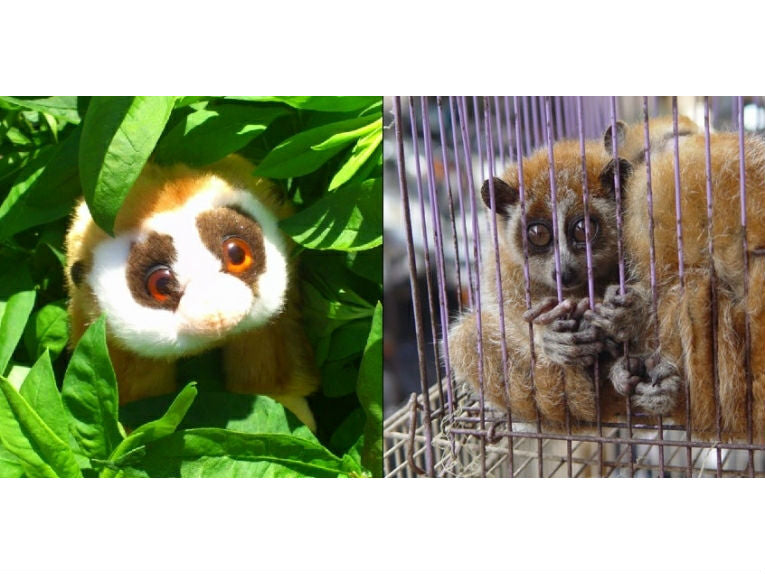We have adjusted, if that is possible, to losing species of animals and plants every day through human expansion. However, the pet trade is one in which we have no excuse for adjusting to at all.
Lemurs and Bush-baby species have a relative known as the slow loris. Species of the slow loris (Nycticebus) are captured by poachers in Indonesia, despite protection laws. There are only five species, with one resident in Sunda and one in Java. Despite $10,000 fines and 5 years in prison, poachers who capture slow lorises for the illegal pet trade remain undeterred. Slow loris poaching is more difficult to check and police compared to tigers and orangs.
International Animal Rescue (IAR) are striving to prevent loris poaching, despite the nocturnal hunters, the small size and easy transportation of lorises to points of sale. You can hear directly from vets Sharmini Julita Paramasivam or Silje Robertson at their blog:
The malu-malu or "shy one," doesn't make a good pet and it's venomous, but its attraction still works and the criminals behind the trade cut out (de-fang) the poisonous teeth using pliers or clippers. Often this causes trauma, needing specialist care, death and of course, the loris cannot feed itself in the wild.
The first attempt at rehabilitation for two of these "pets" rescued by IAR was the "Marta and Willis" radio collar release. After 2 years, the two lorises can still be traced sleeping with wild loris and grooming each other.
Socially, rehabilitation seems to be a success if your teeth are intact. Sadly, that is not possible for 76% of the loris in captivity. Mount Salak National Park in West Java has been chosen for releases, partly because it's just so damned difficult to get there and partly because it's within the natural range of the species. Willis has got himself a partner as well, Marta, for whom the patter of tiny paws is eagerly anticipated. They are also an extra advertisement for the lush green forests of Java that are so much loved for their ecology.
Now for the nitty-gritty. A social awareness campaign for humans this time, to point out the dangers, problems and likely extinction they cause by feeling sorry for an animal at a market. Many are sold locally, despite a rampant international demand. Since 2011, there has been a great penetration of the media and schools, but the markest still exist, if a little more subtly.

A part of the IAR education program - on the frontline in a market!; Credit: © Winarti
As well as slow lorises, International Animal Rescue takes many more animals under its paws, so to speak. If you want to see them on Facebook here are some wonderful pictures of a new orang-utan rehabilitation centre. Just remember that a loris's place is in that lush green forest. Otherwise the habitat will miss a beautiful denizen of its night - or rather all five species at the current rate of loss.










